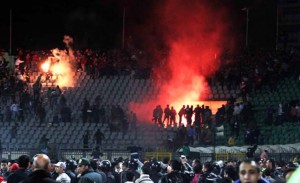
(AFP File Photo)
“Victory to the champions! – The White Knights” is what Sherif Al-Feky last wrote on his Facebook page before he was killed on Sunday night.
Al-Feky, a student at Al-Azhar University and a huge Zamalek club fan, was heading towards the Air Force Stadium in Cairo to watch the national league football game between Zamalek and Enppi. However, he ended up at the morgue, after police forces attempted to disperse the crowded fans ahead of the match.
“I was calling my friend but then someone else picked up and said he was dead,” Mohamed A, told Daily News Egypt referring to Al-Feky, who studied with him at Al-Azhar University.
Over 70 others were killed during a football game between Al-Ahly and Al-Masry teams in the city of Port Said in 2012, amid clashes between fans of both teams. Among the dead fans was Al-Ahly fan group (Ultras Ahlawy) member Kareem Khozam who was studying at the German University in Cairo.
“I always believed I would never be able to live without him until I saw the day when he died,” Khozam’s younger sister said on Al-Ahly TV channel.
Besides Al-Feky and Khozam, many others were killed and hundreds injured in both incidents, including non-ultras members.
Reasons for conflict
2012-Port Said: Al-Masry fans stormed the pitch and attacked Al-Ahly players and fans. Clashes broke out between the two sides.
2015-Cairo: There were a greater number of attendees, more than the tickets issued, which raised tensions between the attendees and security forces.
Security measures
2012-Port Said: The police did not intervene. The surrounding gates of the stadium were closed, leaving no room for the fans to escape the fight.
2015-Cairo: The police tried to disperse the crowded fans and helped players get into the stadium.

(Photo by Amany Kamal)
Ultras narratives
2012-Port Said: The violence resulted in numerous deaths as a result of stabbing, beating, being crushed by the stampede or being thrown off the upper tier of the stadium seating platform.
2015-Cairo: The metal gate was surrounded by barbed wire, enough to let only one person enter. The Ultras White Knights said security forces shot tear gas and rubber bullets.
The magic word – stampede
2012-Port Said: The interior minister said the police force had taken all the needed security measures to ensure the safety of the game. He added the CSF personnel had besieged the attendees after Al-Masry fans stormed the pitch, but due to the stampede both fans started clashing which consequently lead to casualties.
Then parliament members held the police responsible, while TV channels blamed an anonymous third party for triggering the clashes.
2015-Cairo: The interior ministry said they refuse accountability for the incident. Reports by the Forensic Medicine Authority stated that the fans suffocated due to the stampede. In an additional statement, the ministry said it has deliberately dispersed the rallies after attempts from the fans to block the road and prevent the players from entering the stadium.
Politicians, along with the director of the Zamalek Club, said on television that the Muslim Brotherhood group is responsible for the incident. Following the ouster of the MB regime in July 2013, several deadly incidents have been blamed on the group.
What happened next?
2012-Port Said: The league was put off. Seventy-three people were put on trial after being accused of premeditated murder. The first verdict came in January 2013, when 21 people were sentenced to death.
Additionally, the interior ministry banned any audience from attending football games indefinitely.
2015-Cairo: The match carried on despite the unrest outside the stadium. Omar Gaber, a Zamalek team player decided not to take part in the match in response to the incident and was suspended indefinitely.
The general prosecutor ordered investigations in the incident. Eighteen people were arrested according to the interior ministry spokesperson.



